Conservatives take five Labour heartland seatspublished at 11:26 GMT 6 November 2020
Labour loses Bishop Auckland, Darlington, Stockton South, Redcar and Tony Blair's old Sedgefield seat.
Read MoreNightmare election for Labour as they lose seven key seats
Redcar, Sedgefield, Darlington, Stockton South, Durham North West and Bishop Auckland all fall
Redcar and Bishop Auckland had never had a Conservative MP
Conservatives also take Blyth Valley for the first time since it was created in 1950
Alex Cunningham, new Labour MP for Stockton North, calls on Corbyn to resign
Labour hold Hartlepool in the face of Brexit Party and Tories
Labour hold more than a dozen other seats, all with reduced majorities
Conservatives have won an overall majority in the general election
Labour loses Bishop Auckland, Darlington, Stockton South, Redcar and Tony Blair's old Sedgefield seat.
Read MoreSteve Bruce and Sean Dyche question the appointment of referee Tim Robinson in Burnley's 1-0 win over Newcastle at Turf Moor.
Read MoreMark Lawrenson takes on comedian, author and Chelsea fan David Baddiel to make predictions for the latest round of Premier League fixtures.
Read MoreAndre Ayew scores two goals as Swansea City win 3-1 against nine-man Middlesbrough.
Read MoreSeats held by Labour for generations across the Midlands and north of England are won by the Tories.
Read MoreOur live coverage has ended here for today and for the week, thank you for joining us.
You can stay up to date tonight and over the weekend online, on BBC Newcastle, BBC Tees and Look North.
We'll be back with more live updates from 08:00 on Monday morning and hope you can join us then.
If you want to get in touch with any news or send us photos you can tweet us, external, contact us via our Facebook page , externalor email us.
Among some voters there was not a great deal of surprise Labour had fared badly in the North East in the election.
Keith Shield, from Catchgate, in the Durham North constituency, which remained Labour, said: "I know what the Conservatives did in the past when (Margaret) Thatcher was in power, and she used the police as a political weapon, that was totally wrong, and the miners strike.
"My father was a miner, so was his younger brother and my older brother. If they had come back and seen how the Labour party had declined and descended into, led by people like that they wouldn't have believed it.
"The Labour party then was a party worth voting for and they did look after people's rights but these people are only interested in dogma.
"They would have bankrupted our country with their policies and there was no way back from that."
He said he wanted to see more investment in the area because he thought it had been neglected.
He said he believed the Conservatives in power were a step in the right direction
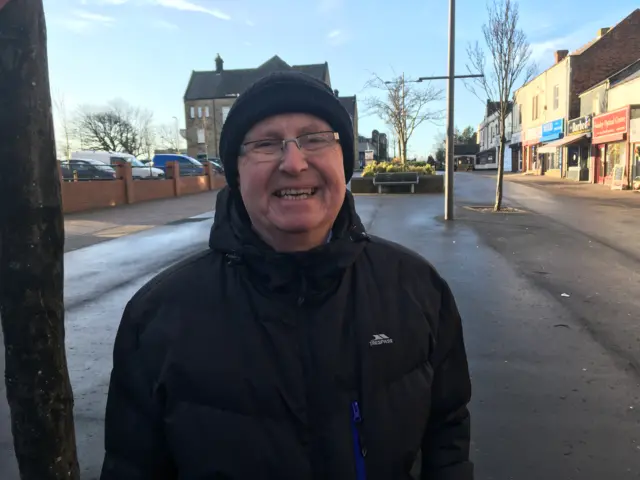
How to find out the general election results from England's 533 constituencies.
Read More BBC Radio 5 Live
BBC Radio 5 Live
BBC Radio 5 Live presenter Anna Foster is in Sedgefield in County Durham - which used to be former Labour PM Tony Blair's constituency. It's been won by the Conservatives, who have taken five key constituencies in north-east England.
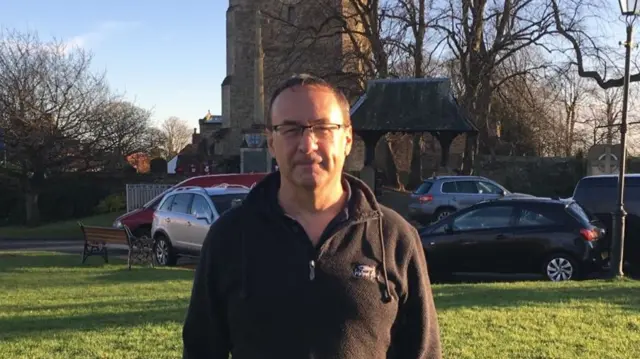
Stephen voted Independent.
"When I got to the ballot paper I couldn't make my mind up," he told Anna, "but the one thing I wasn't going to vote for was the Labour Party.
"I've voted Labour all my life and it was because of one man, and that was Jeremy Corbyn, it wasn't because of Brexit.
"I didn't want Corbyn to be in Number 10 and have the SNP with Nicola Sturgeon having a big say... that was just unpalatable to me.
"There wasn't space to write 'none of the above' on the ballot paper."
Have your say: Text 85058 / @BBC5Live, external
Former North East Labour MPs have changed their Twitter biographies following the party's poor performance in the general election.
Phil Wilson lost his Sedgefield seat to the Conservatives. He's now changed his Twitter bio to "Staying calm and listening to jazz".
 Image source, Twitter
Image source, TwitterAnd Anna Turley, who lost her Redcar seat to Conservative Jacob Young simply has the word "free" on hers.
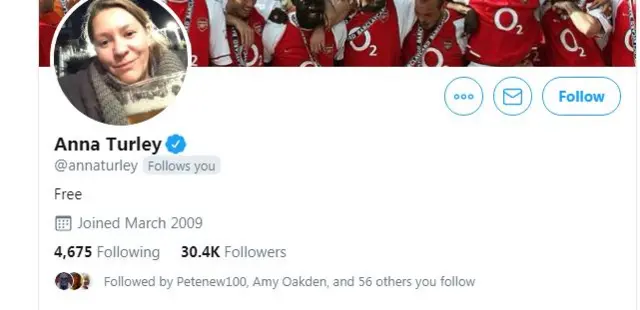 Image source, Twitter
Image source, TwitterVoters in Redcar elected a Conservative MP for the first time in the constituency's history.
Some of them explained that it was Jeremy Corbyn which made a difference.
Allow X content?
This article contains content provided by X. We ask for your permission before anything is loaded, as they may be using cookies and other technologies. You may want to read X’s cookie policy, external and privacy policy, external before accepting. To view this content choose ‘accept and continue’.
 Professor Sir John Curtice
Professor Sir John Curtice
Polling expert
The map below gives a clear indication of how much the political situation in the North East has changed from yesterday to today.
Support for the Conservatives rose by four points in the Midlands, the North East and Yorkshire - the regions of England that voted most heavily in favour of Leave.
In contrast, the party's vote fell back by a point in London and the South East.
Conversely, Labour saw its vote fall by 12 to 13 points in the North East and Yorkshire, while it fell by only six or seven points in London and the South of England.
The result also saw Labour lose ground heavily in its traditional working-class heartlands.
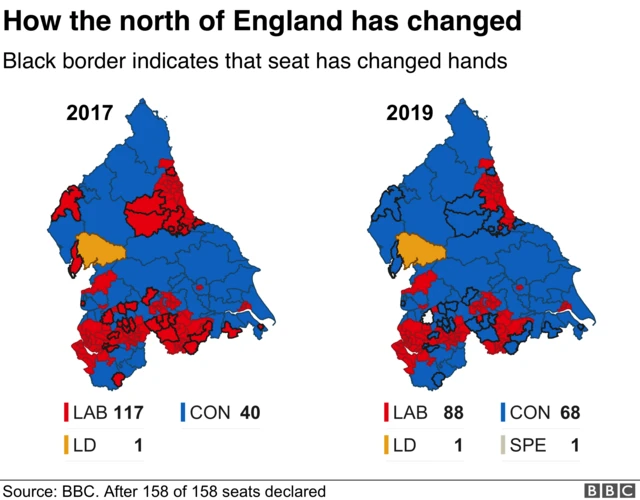
Ian Levy got 17,440 votes to win the seat which has been held by Labour since it was created in 1950.
Read MoreMichael Wild
Political programmes editor, North East & Cumbria
One of the shocks of last night's results was Labour's Laura Pidcock losing her North West Durham seat to Conservative Richard Holden.
Before that she was seen as a potential leadership contender. In 2017, her majority was more than 8,000.
Until last night North West Durham was the sort of “no-hoper” seat that young ambitious Conservatives looking to cut their political teeth were pointed towards.
A constituency made up of former mining and steel towns such as Consett and Stanley, it was working class through and through.
At the height of Labour’s success in 1997, the local MP Hilary Armstrong took nearly 69% of the vote – more than double all the other parties added together.
One Conservative keen to make her mark at the start of her career was Theresa May, a councillor in London when she travelled north to be selected as Conservative candidate at the 1992 General Election.
She came second with the future Liberal Democrat leader Tim Farron trailing in third. For Mrs May it was a step up the political ladder and by 1997 she’d been rewarded with the far more winnable constituency of Maidenhead.
But things have moved on – and the Conservative party has proved it’s capable of winning, even in the former Labour heartlands of the North East
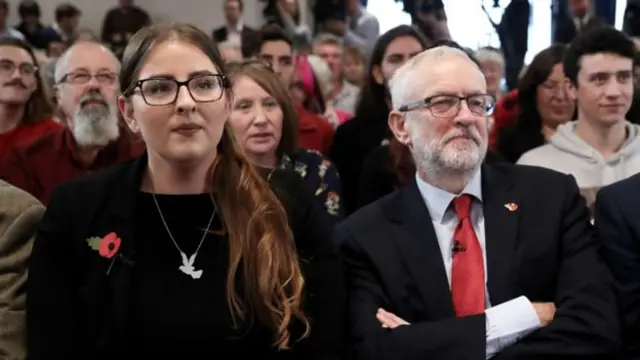 Image source, Getty Images
Image source, Getty Images Danny Savage
Danny Savage
North of England correspondent
For the six weeks of the general election campaign, I travelled around the UK talking to voters in numerous constituencies for Radio 4. We tried to mix up the type of constituencies - not just marginal - but safe seats, target seats and different voter demographics.
The first was in Hartlepool, where it felt like the Brexit party could potentially gain a seat. But six weeks on, the Brexit Party threat had vanished.
The Conservative vote felt solid from the outset, but a day at the races at Wolverhampton brought home the extent of pro Tory feeling. Here we found lifelong Labour supporters who were turning to the Tories. The reason? Jeremy Corbyn.
On the streets of Britain, Mr Corbyn proved to be the most divisive figure in politics. Yes, we heard from fans, some who described him as a breath of fresh air, but they were in the minority.
In short, the electorate disliked Jeremy Corbyn to such a level that he forced many of them to turn their back on the party they had always voted for. If I had a pound for every time somebody expressed their dislike for him, I would have lots of pounds.
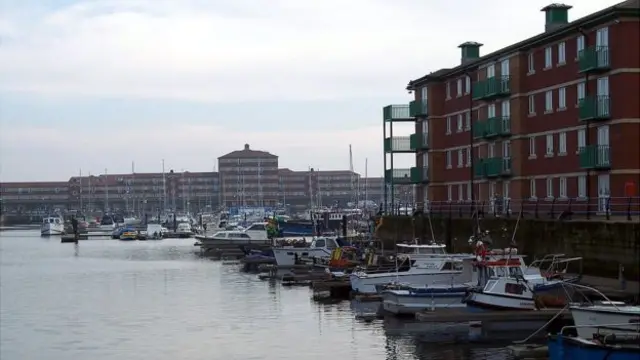
The election results are in but what else do you want to know?
Do you still have questions about the general election?
It could be a query over what happens next or an issue close to your heart.
You can find out the results for your area by using our constituency pages and catch up on the night's key points here.

Wansbeck MP Ian Lavery, who is also the chairman of the Labour party, has defended Jeremy Corbyn's decision not to step down as leader immediately, saying the party will have a "post-mortem" into its "disastrous results".
Mr Corbyn has said he will not lead Labour into the next election, following a "very disappointing night" for his party.
But he said he would stay on as leader during a "process of reflection" on the result, which was its worst since 1935.
Mr Lavery said: "It's so disappointing what's happened, bearing in mind the fantastic manifesto we've had, the way people have embraced probably what's been the best manifesto the Labour party has ever produced.
"We'll be discussing it, we'll be letting the dust settle and looking at how we go forward as a party in the next few days or so."
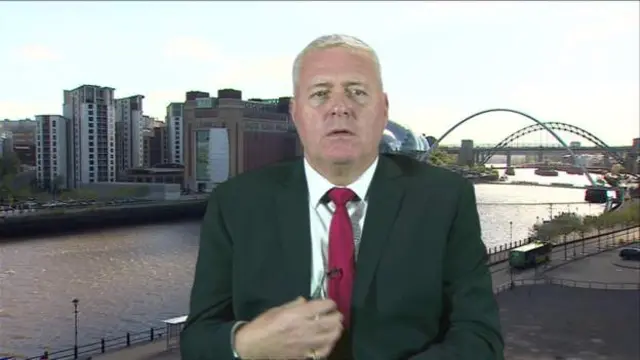
 Today Programme
Today Programme
BBC Radio 4
Like most of Jeremy Corbyn's allies, Labour Party chairman Ian Lavery, blames "hostility" towards the party's Brexit stance for its defeat.
Mr Lavery held on to his Wansbeck seat but his majority fell from 10,435 to just 814.
He tells the BBC Radio 4's Today programme the only difference between the 2017 election and this election is that Labour is now backing another EU referendum.
Mr Lavery says there is a "lack of trust" because Labour promised in its 2017 manifesto to respect the referendum result and many people in white working class communities now feel the party is "trying to block Brexit".
Asked how long Mr Corbyn should remain Labour leader, Mr Lavery says, "Jeremy will assess the situation in the next couple of days and we’ll take it forward from there".
He adds that Mr Corbyn is "a man of real integrity" and will act in "the best interests of the Labour Party".
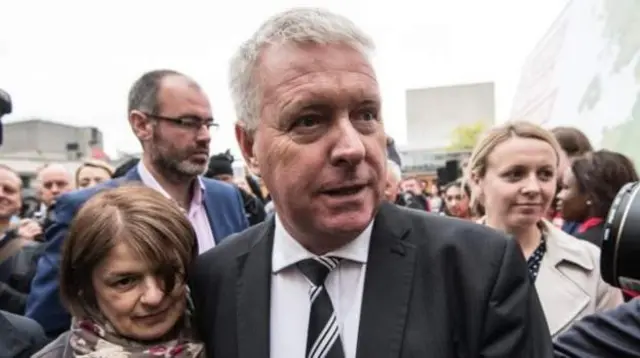 Image source, Getty Images
Image source, Getty Images Richard Moss
Richard Moss
Political Editor, BBC Look North
The North East has seen the equivalent of a political earthquake - the region has not seen as many seats change hands in one election in living memory.
Margaret Thatcher never had as many MPs in this region as Boris Johnson will have. And some now represent constituencies we were told would never vote Conservative.
Communities built on the steel industry, like Consett and Redcar, and former mining areas like Blyth Valley and Bishop Auckland have placed their trust in the Tories.
The Labour party chairman Ian Lavery, a former miner, survived by the skin of his teeth in Wansbeck. Laura Pidcock, a Corbynite who could have been in the running to be the next Labour leader, saw North West Durham's voters reject her.
So what happened? Get Brexit Done certainly resonated. The gains were all in leave-voting seats which seem to have blamed Labour for the parliamentary deadlock.
But Labour candidates will tell you that Jeremy Corbyn was a bigger issue on the doorstep. Not many of their voters wanted him anywhere near Number 10.
But there are dangers. Every economic study suggests it's the North East that will suffer the most harm from leaving the European Union. And just talking about the idea of a Northern Powerhouse will no longer be enough.
Constituents of these new Conservative MPs will expect them and their party to deliver Brexit, but also more investment in the North.
A look at some of the standout moments from across England in the 2019 general election.
Read More